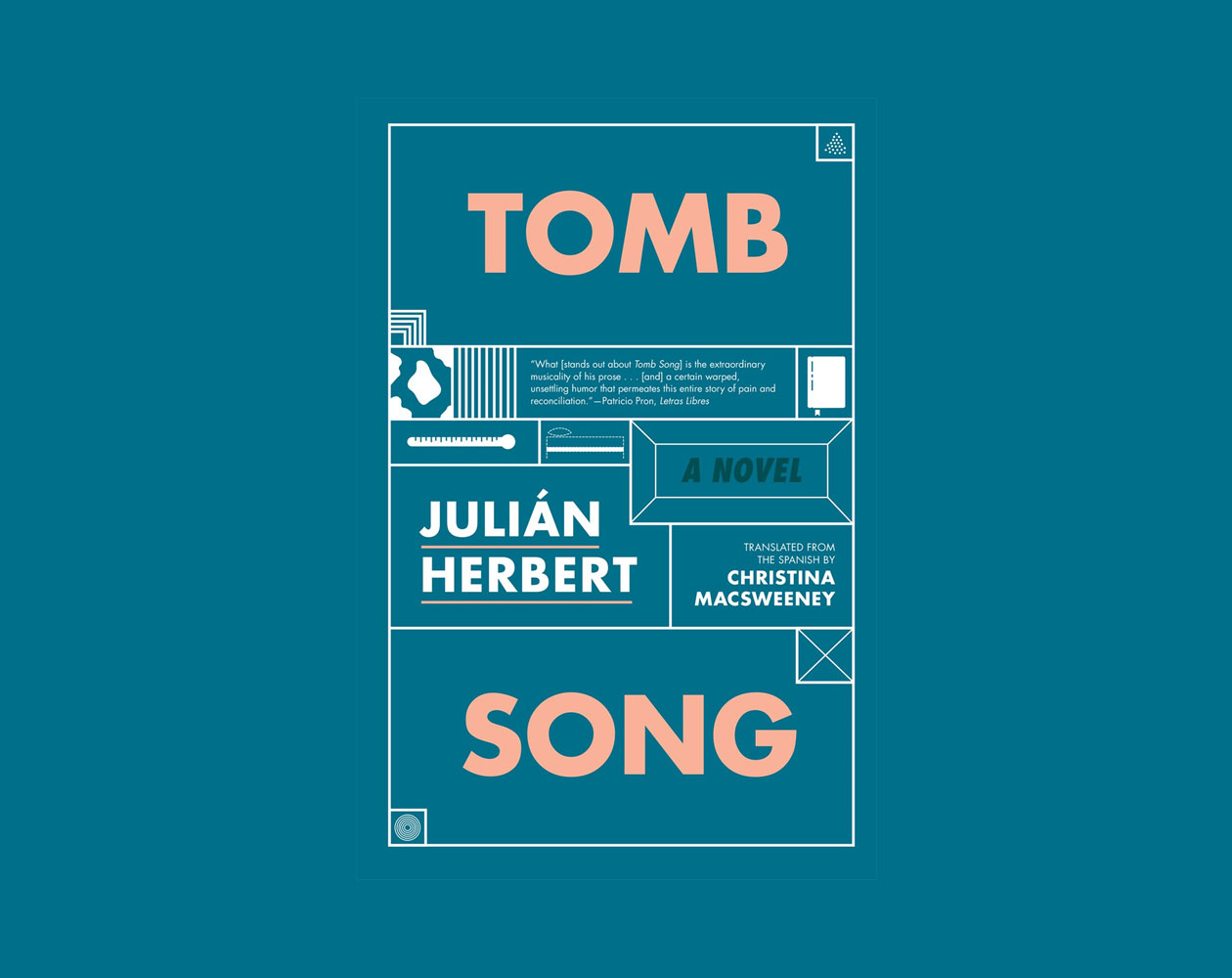The 2018 Rooster Summer Reading Challenge: Week Two
We wrap up our first book of the summer, Tomb Song by Julián Herbert, in conversation with novelists Laura van den Berg and Rosecrans Baldwin.

Welcome to the 2018 Rooster Summer Reading Challenge. We’ve selected six Rooster-worthy works of fiction from 2018 to read over the next three months—two per month—and once a week we’ll meet back here to discuss our reading progress.
Each month we’ll be joined by a new judge, who will discuss the books with us and then select which of the two books that month heads to our summer finale at the end of August—where you, our readers, decide which novel wins the 2018 Rooster Summer Reading Challenge, and an automatic berth in the 2019 Tournament of Books. (And that counts for a lot, considering our 2017 summer winner, Fever Dream, stampeded through this year’s ToB, eventually taking home the Rooster.)
To select our summer books, each of our judges chose a work of fiction they’re particularly excited about this year. The other three books were selected by the ToB Committee according to our normal criteria—novels first published in English in the calendar year that we feel are excellent and interesting. (To avoid conflicts, none of the judges are assigned the books they select.)
A special thanks to our Sustaining Members for making another year of the Rooster Summer Reading Challenge possible. Find out why The Morning News and the Tournament of Books depend on your support, and please consider becoming a Sustaining Member or making a one-time donation.
This month we’re reading Tomb Song by Julián Herbert and An American Marriage by Tayari Jones, with novelist Laura van den Berg.
- See the reading list and discussion schedule
- Catch up on previous chats: Tomb Song (first half)
- Jump into today’s discussion in the comments
Please note: We receive a cut from purchases made through the book links in this article.
Rosecrans Baldwin: Hi everybody. Welcome to week two of the Summer Reading Challenge, in which we’ll finish Tomb Song and prepare for An American Marriage. This month we’re joined by novelist Laura van den Berg, whose new novel The Third Hotel will be published in August by Farrar, Straus and Giroux.
Laura, let’s talk specifically about the second half of the book. Did you find yourself more hooked or less? The Havana scenes maybe, considering how your new book takes place there? How about the weird sexual relationship with the newscaster and then the revelations he later documents?
Laura van den Berg: Yeah, in The Third Hotel, substantial portions take place at a film festival in Havana. I took research trips while working on the book—so I started recognizing certain streets and neighborhoods when I got to “Ghosts in La Habana.” For personal reasons if nothing else I was excited to get to the Havana sections, but I have to say—the novel lost some steam for me there. There were still moments and lines I found terrifically striking, and yet some of the misogyny-tinged debauchery of the Havana sections were kinda predictable to me, in a novel that’s been anything but. At the same time, a purposeful unmooring and distortion is happening here, which feels important to the book’s overall movement. And I was very interested in the red book passages.
Rosecrans: Before we get to that, what led you to setting Hotel in Cuba?
Laura van den Berg is the author of the novel Find Me and two story collections, What the World Will Look Like When All the Water Leaves Us and The Isle of Youth. Her next novel, The Third Hotel, will be published by FSG in August. Laura lives in Cambridge, Mass., with her husband and dog.
Rosecrans Baldwin is a founding editor of The Morning News. He is the author of You Lost Me There and Paris, I Love You but You’re Bringing Me Down. His latest novel, The Last Kid Left, was one of NPR’s Best Books of the Year.
Laura: So many intersecting reasons! Here are a few. First, I’m interested in the travel novel as a form, even as I understand it to be a form that comes with baggage (especially the American abroad subset). I love so many books that might considered travel or abroad novels in one way or another: Katie Kitamura’s A Separation (a 2017 Rooster Summer Reading Challenge contender—ed.), Damon Galgut’s In a Strange Room, Chris Kraus’s Torpor, Adolfo Bioy Casares’s The Invention of Morel, Cristina García’s Here in Berlin, to name a few. For a while, I had a kind of constellation of narrative elements that I felt were conversant with contemporary Havana, but it took me a while to understand the how and the why.
Second, like I said, a film festival is central to the Havana sections—the narrator’s recently deceased husband was a film studies professor who specialized in horror films; he had plans to attend this particular festival, to interview a director, and after his death she goes in his place—and the book is set in 2015, a year that saw a major influx in American tourists. I spent a lot of time with the vocabulary of tourism, and the particular kinds of desires that vocabulary seems designed to ignite, the promises made and how those promises change or vanish altogether depending on who you are. Perhaps the language caught my eye in part because I’m from Orlando, Fla., a place that has been powerfully shaped by tourism; Havana and Orlando are of course radically different contexts, but this was an open door, so to speak. And then, at a certain point in my research, I realized that some theoretical writings on tourism used language very similar to that of cinematic scholarship, and that discovery allowed for increased synergy between subject and place.
Rosecrans: I imagine there’s a lot for a writer to struggle with, setting the book in Cuba?
Laura: Havana is a uniquely complicated city, and contains a great many complicated histories, and I knew it would be a monumental challenge to set any part of the story there—especially given that I’ve never been anything else but a visitor, and thus my eye on the place is always going to be incomplete and comprised. So my strategy was to focus on a few small ecosystems within the larger landscape of Havana where I could locate points of entry—the film festival and the world of hotels, for example.
Rosecrans: For Tomb Song, now that we finished, I gotta say I’m pretty 50/50 on the novel’s more digressive sections. The Havana passages, the fantasies around the broadcaster-lover, even the dullness of the Germany sections, or what I found to be dull. What do you think: self-indulgent on the author’s part? Were they still useful, necessary somehow? I’d say yes to both.
Laura: Well, I’m not sure I’d say self-indulgent. I did feel a loss of momentum there, but on the flipside one could argue that the final section, “Life on Earth,” is made more powerful by the deep unmooring of the previous sections.

Sitting at the bedside of his mother as she is dying from leukemia in a hospital in northern Mexico, Julián is immersed in memories of his unstable boyhood and youth. As he wanders the hospital, he tells fevered stories of his life, from a trip with his pregnant wife to a poetry festival in Berlin to a drug-fueled and possibly completely imagined trip to another festival in Cuba. (Amazon / IndieBound / Powell’s)
Book description excerpted from publisher’s summary and edited for length.
Rosecrans: For sure. And my favorite moments in the novel were in the “Life on Earth” section. For instance, I was grateful to be back with Monica. I liked the brother and sister updates, the birth of Leonardo, the father’s ghostiness. It put all the literary shenanigans in relief and returned me to what I value most in this book: a man grappling with all of the peculiarities and mindfucks of this very commonplace experience of coming to terms with a parent’s death.
Laura: Totally agree. I found “Life on Earth” so dynamic and compelling—and as the title suggests, it does mark a welcome, clear-eyed return to Earth, after the fever of the previous sections. I was moved by the tender exchanges with Monica (the Attenborough bit, the game with the sheets); the collision of personal and national violence; the way time accelerates, vaulting us into future losses.
Rosecrans: The first line of the last chapter—“I don’t remember when I saw her on her feet for the last time”—that’s just gutting. It was a teary ending for me, in a fucking Starbucks of all places, and it wasn’t even a sentimental ending!
Laura: Totally unsentimental!
Rosecrans: I loved it. Maybe because I’m at the point in life where I’m facing my parents and in-laws aging, and the final paragraph is so tender. How about you?
Laura: For me it was powerfully emotional. I’ve been navigating my parents getting older and their health beginning to falter, so there’s that extra resonance there for me as well. The last paragraph—the description of the squeeze of the hand (or near squeeze)—slayed me in part because it holds so much of the complexity of the mother/son relationship.
Rosecrans: We’re about to start what I assume what will be a very different novel, if only going by the jacket copy. What do you think you’re going to remember about Tomb Song? What’s your overall impression now that you’re done?
Laura: My overall impression is that I want to reread Tomb Song immediately. I mean this as a compliment. I found so much of the novel to be utterly exhilarating: it’s such a layered book and I feel certain that I didn’t fully absorb all of the layers, on first reading. This is a novel that rewards continued visitations, I suspect.
At the line level, these two bits feel very alive in my mind from the second half: “Something fraternity has no streets: just blind alleys. And a traffic cop standing in the blood saying, ‘keep moving, keep moving, keep moving.” And “Love is a powerful virus.”
Rosecrans: Those are great. Thanks, Laura. Readers, let us know your final thoughts on Tomb Song in the comments, then get back here next Wednesday when we dive into An American Marriage. And thanks as always for joining in on the fun!
Subscribe to the Rooster newsletter
You will receive email from The Tournament of Books. Opt out at any time. (View our privacy policy.)

